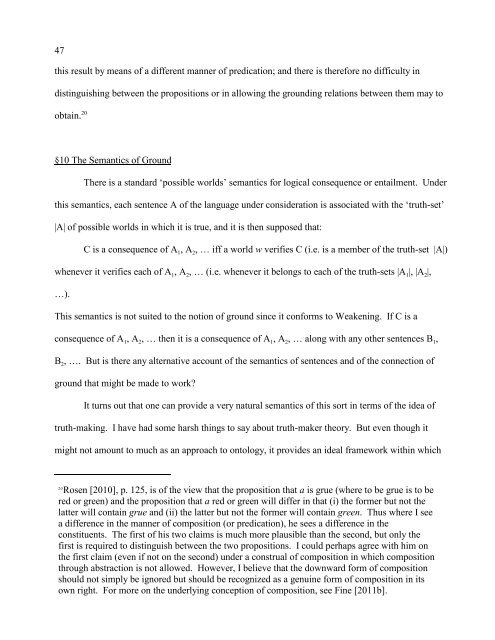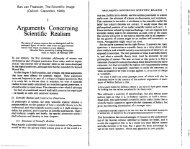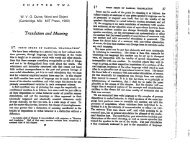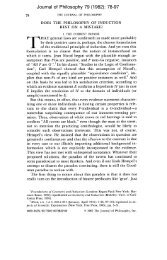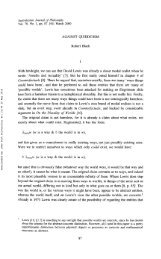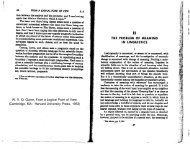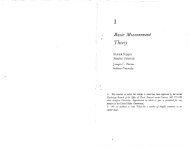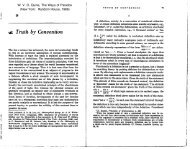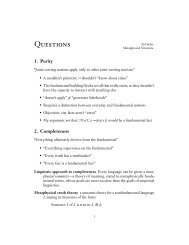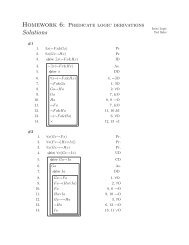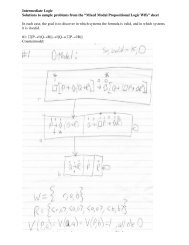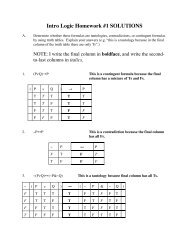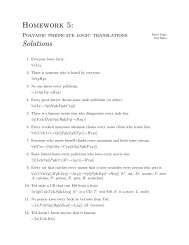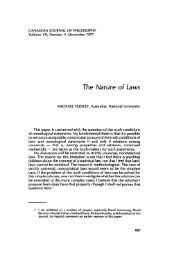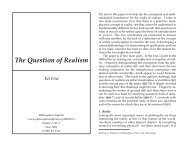Fine - guide to ground.pdf - Ted Sider
Fine - guide to ground.pdf - Ted Sider
Fine - guide to ground.pdf - Ted Sider
Create successful ePaper yourself
Turn your PDF publications into a flip-book with our unique Google optimized e-Paper software.
47<br />
this result by means of a different manner of predication; and there is therefore no difficulty in<br />
distinguishing between the propositions or in allowing the <strong>ground</strong>ing relations between them may <strong>to</strong><br />
20 obtain.<br />
§10 The Semantics of Ground<br />
There is a standard ‘possible worlds’ semantics for logical consequence or entailment. Under<br />
this semantics, each sentence A of the language under consideration is associated with the ‘truth-set’<br />
|A| of possible worlds in which it is true, and it is then supposed that:<br />
C is a consequence of A 1, A 2,<br />
… iff a world w verifies C (i.e. is a member of the truth-set |A|)<br />
whenever it verifies each of A 1, A 2, … (i.e. whenever it belongs <strong>to</strong> each of the truth-sets |A 1|, |A 2|,<br />
…).<br />
This semantics is not suited <strong>to</strong> the notion of <strong>ground</strong> since it conforms <strong>to</strong> Weakening. If C is a<br />
consequence of A 1, A 2, … then it is a consequence of A 1, A 2, … along with any other sentences B 1,<br />
B 2,<br />
…. But is there any alternative account of the semantics of sentences and of the connection of<br />
<strong>ground</strong> that might be made <strong>to</strong> work?<br />
It turns out that one can provide a very natural semantics of this sort in terms of the idea of<br />
truth-making. I have had some harsh things <strong>to</strong> say about truth-maker theory. But even though it<br />
might not amount <strong>to</strong> much as an approach <strong>to</strong> on<strong>to</strong>logy, it provides an ideal framework within which<br />
Rosen [2010], p. 125, is of the view that the proposition that a is grue (where <strong>to</strong> be grue is <strong>to</strong> be<br />
20<br />
red or green) and the proposition that a red or green will differ in that (i) the former but not the<br />
latter will contain grue and (ii) the latter but not the former will contain green. Thus where I see<br />
a difference in the manner of composition (or predication), he sees a difference in the<br />
constituents. The first of his two claims is much more plausible than the second, but only the<br />
first is required <strong>to</strong> distinguish between the two propositions. I could perhaps agree with him on<br />
the first claim (even if not on the second) under a construal of composition in which composition<br />
through abstraction is not allowed. However, I believe that the downward form of composition<br />
should not simply be ignored but should be recognized as a genuine form of composition in its<br />
own right. For more on the underlying conception of composition, see <strong>Fine</strong> [2011b].


